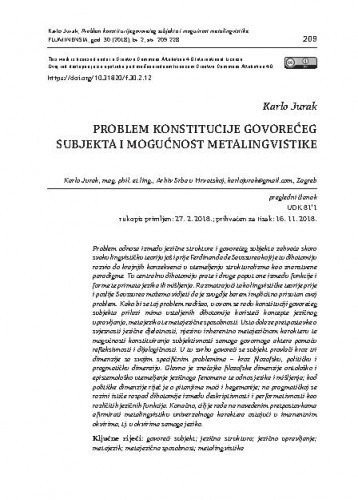Problem odnosa između jezične strukture i govorećeg subjekta zahvaća skoro svaku lingvističku teoriju još i prije Ferdinanda de Saussurea koji je tu dihotomiju razvio do krajnjih konzekvenci u utemeljenju strukturalizma kao znanstvene paradigme. Tu centralnu dihotomiju prate i druge poput one između funkcije i forme te primata jezika ili mišljenja. Razmatrajući tako lingvističke teorije prije i poslije Saussurea možemo vidjeti da je svugdje barem implicitno prisutan ovaj problem. Kako bi se taj problem nadišao, u ovom se radu konstituciji govorećeg subjekta prilazi mimo ustaljenih dihotomija koristeći koncepte jezičnog upravljanja, metajezika te metajezične sposobnosti. Uz to dolaze pretpostavke o svjesnosti jezične djelatnosti, njezinu inherentno metajezičnom karakteru te mogućnosti konstituiranja subjektivnosti samoga govornoga aktera pomoću refleksivnosti i dijalogičnosti. U tu svrhu govoreći se subjekt provlači kroz tri dimenzije sa svojim specifičnim problemima – kroz filozofsku, političko i pragmatičku dimenziju. Glavna je značajka filozofske dimenzije ontološko i epistemološko utemeljenje jezičnoga fenomena te odnos jezika i mišljenja; kod političke dimenzije riječ je o pitanjima moći i hegemonije; na pragmatičkoj se razini ističe raspad dihotomije između deskriptivnosti i performativnosti kao različitih jezičnih funkcija. Konačno, cilj je rada na navedenim pretpostavkama afirmirati metalingvistiku univerzalnoga karaktera ostajući u imanentnim okvirima, tj. u okvirima samoga jezika; The problem of the relationship between the linguistic structure and the speaking subject is present in almost all linguistic theories, even those that were postulated prior to that of Ferdinand de Saussure who developed the said dichotomy to its fullest. Other dichotomies such as “function-form” and “language-thought” follow this central dichotomy. In this sense, the problem of this relationship is present in every linguistic theory before and after Saussure, at least implicitly. In order to overcome this problem, in this paper we examine the constitution of the speaking subject outside of the fixed dichotomies. Instead, we use the concepts of language management, metalanguage and metalingual ability. This calls for some hypotheses about language activity awareness, its inherently metalinguistic character and the possibility of the constitution of the speaking actor´s subjectivity through reflexivity and dialogicality. For this purpose, the speaking subject, with its specific problems, is viewed through three different prisms: the philosophical, the political and the pragmatic one. The main characteristic of the philosophical dimension is the ontological and epistemological foundation of linguistic phenomena and the relationship between language and thought; the political dimension deals with the questions of power and hegemony; the pragmatic dimension emphasizes the breakdown of the dichotomy between descriptiveness and performativity as different linguistic functions. Finally, the goal of the paper is to establish universal metalinguistics, relying on the abovementioned hypotheses, while remaining within the immanent frameworks, i.e. within the framework of language itself.
Sažetak

